|
|
|
Sort Order |
|
|
|
Items / Page
|
|
|
|
|
|
|
| Srl | Item |
| 1 |
ID:
167452
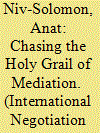

|
|
|
|
|
| Summary/Abstract |
President Clinton was deeply engaged and invested in the Israeli-Palestinian peace process, and this commitment seems to transcend administrations as Presidents Bush, Obama, and more recently Trump have made considerable efforts to mediate the Palestinian-Israeli conflict. This article addresses the question of why would a US president risk his own legacy and the reputation of the office as an international mediator to try to solve this complicated case in the face of expected and proven failures? This study traces efforts made by recent US Presidents to mediate the long-standing protracted conflict between Palestinians and Israel understand the reasons for the ongoing US commitment to this process, and why different presidents and their administrations persist in their mediation attempts where their predecessors failed.
|
|
|
|
|
|
|
|
|
|
|
|
|
|
|
|
| 2 |
ID:
170714
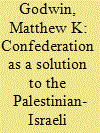

|
|
|
|
|
| Summary/Abstract |
This article analyzes the applicability of the confederative model to the Palestinian-Israeli conflict. Based on a comparative examination of successful and failed federative/confederative experiences in the 20th century, it argues that applying this solution to the Palestinian-Israeli conflict will prove highly challenging if not wholly impossible. This is mainly because of the power asymmetry between two parties; dissimilar political systems (democratic vs authoritarian/dictatorial); restricted Palestinian sovereignty; failure to recognise Jewish self-determination; and the likelihood that this arrangement will need to be imposed
|
|
|
|
|
|
|
|
|
|
|
|
|
|
|
|
| 3 |
ID:
130412
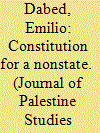

|
|
|
|
|
| Publication |
2014.
|
| Summary/Abstract |
This article sheds new light on the political history of legal-constitutional developments in Palestine in the fourteen years following the Oslo Accord. It examines the relationship between the unfolding social, political, and economic context in which they arose, on the one hand, and PA law-making and legal praxis, on the other. Focusing on the evolution of the Palestinian Basic Law and constitutional regime, the author argues that the "Palestinian constitutional process" was a major "battlefield" for the actors of the Palestinian-Israeli conflict. Thus, changes in the actors' political strategies at various junctures were mirrored in legal-constitutional forms, specifically in the political structure of the PA. In that sense, the constitutional order can be understood as a sort of "metaphoric representation" of Palestinian politics, reflecting, among other things, the colonial nature of the Palestinian context that the Oslo process only rearticulated. This perspective is also essential for understanding the evolution of the Palestinian-Israeli conflict after Oslo.
|
|
|
|
|
|
|
|
|
|
|
|
|
|
|
|
| 4 |
ID:
133508


|
|
|
|
|
| Publication |
2014.
|
| Summary/Abstract |
The study examines the effect of female suicide attacks on foreign media framing of conflicts. Examining the Palestinian-Israeli conflict, 2,731 articles were sampled that covered terrorist events (American, British, and Indian press); 625 appeared in the week following a female's suicide attack, 97 reported an attack by a female perpetrator. The findings suggest that foreign media discourse around female suicide bombers promotes more messages about the society within which the terrorists are embedded. Since the coverage of female terrorists tends to provide more detailed information about the perpetrator, it focuses more on the terror organizations' side of the conflict's story.
|
|
|
|
|
|
|
|
|
|
|
|
|
|
|
|
| 5 |
ID:
082493
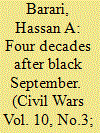

|
|
|
|
|
| Publication |
2008.
|
| Summary/Abstract |
This article examines how Jordan's position vis-vis the Palestinians has evolved in the aftermath of the military showdown in 1970. Time and again, Jordan sought to speak for the Palestinians at the expense of the Palestinian Liberation Organization (PLO). However, to the chagrin of the Jordanian monarch, the PLO won the battle over representing the Palestinians. Hence, the classical Jordanian school of thought that viewed the occupied territories as part of Jordan, gave way to the emergence of a more assertive school that views the establishment of an independent Palestinian state to be in the best interest of Jordan. For this reason, Jordan digs in its heels and refuses calls for confederation with the Palestinians. Indeed, Jordan has been active in creating a momentum for a two-state solution to bring the Palestinian-Israeli conflict to an end. It remains to be seen, however, how Jordan and the Palestinians will relate in case a two-state solution does not materialize
|
|
|
|
|
|
|
|
|
|
|
|
|
|
|
|
| 6 |
ID:
181231
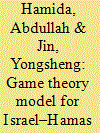

|
|
|
|
|
| Summary/Abstract |
This article offers a game theory-based theoretical framework for explaining the Israel–Hamas indirect ceasefire negotiations in the decade attending the Islamist organisation’s takeover of the Gaza Strip in 2007. It shows that Hamas’s relentless commitment to Israel’s destruction notwithstanding, whenever the two adversaries reached ad hoc agreements, both collaborated (however, indirectly) in maintaining a state of calm. As such, the proposed analytical framework provides a useful tool for conflict management analysis in terms of actions, duration and modes of settlement.
|
|
|
|
|
|
|
|
|
|
|
|
|
|
|
|
| 7 |
ID:
170712
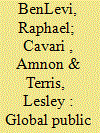

|
|
|
|
|
| Summary/Abstract |
How do publics around the world view Israel? With which side of the Palestinian-Israeli conflict are their sympathies and why? Using Pew survey data from 45 countries we analyse individual-level attitudes towards the two sides to the conflict, testing the influence of security factors, regime types and economic relations, as well as religious identity. We find a large range of attitudes, including high levels of sympathy for both Israel and the Palestinians as well as high levels of neutrality. Religious identity plays the most central role in determining whom to support, whereas economic and security factors are secondary.
|
|
|
|
|
|
|
|
|
|
|
|
|
|
|
|
| 8 |
ID:
081344
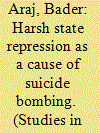

|
|
|
|
|
| Publication |
2008.
|
| Summary/Abstract |
Although students of social movements have established that state repression strongly affects protesters' choice of tactics, this finding has been ignored by most analysts of suicide bombing. Based on data collected from various sources, including 88 interviews the author conducted in 2006 with senior leaders of six Palestinian political organizations and close relatives and friends of Palestinian suicide bombers, this article argues that harsh state repression is a major cause of suicide bombing. It shows that understanding the effect of state repression is crucial to clarifying many of the unsolved puzzles concerning the rationales of organizations that employ suicide bombing, the motivations of individual suicide bombers, and the reasons why this tactic has become popular in some societies. The article concludes that there are three types of organizational rationales underlying the use of suicide bombing. Suicide bombing may be an extreme reaction to extreme state repression, a combined reactive and strategic action, or a purely strategic action. Different contexts and organizations typify these organizational rationales.
|
|
|
|
|
|
|
|
|
|
|
|
|
|
|
|
| 9 |
ID:
190050
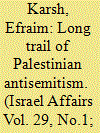

|
|
|
|
|
| Summary/Abstract |
Contrary to the commonly held misconception, Palestinian antisemitism is not a corollary of the Palestinian-Israeli conflict but the other way around: the perpetuation of the conflict is a direct result of the deeply ingrained Palestinian-Arab Jew-hatred and the attendant rejection of any form of Jewish statehood. From the onset of the conflict, a century ago to this day, Palestinian Arabs have been subjected to a sustained hate campaign of racial, religious and political incitement that has portrayed Jews (and Israelis) as the source of all evil, synonyms for iniquity, corruption and decadence, whose clear and present danger to human kind can only be removed through their complete annihilation. Small wonder that not a single Palestinian-Arab leader has ever recognised the millenarian Jewish attachment to the Land of Israel or evinced a true liking for the ‘two-state solution’ since it was first evoked in 1937.
|
|
|
|
|
|
|
|
|
|
|
|
|
|
|
|
| 10 |
ID:
091959
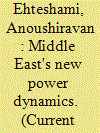

|
|
|
|
|
| Publication |
2009.
|
| Summary/Abstract |
Relations among the regional powers in the Middle East continue to dominate global conerns about security. As we watch the era of George W. Bush fade into history, we are still saddled with the consequences of politics that unleashed US military might in the region and, in the process, caused substanial imbalances among the regional powers that have proved difficult to redress.
|
|
|
|
|
|
|
|
|
|
|
|
|
|
|
|
| 11 |
ID:
175762


|
|
|
|
|
| Summary/Abstract |
Several peace plans have been initiated throughout the years of the Palestinian-Israeli conflict, and all have been pigeonholed with a veiled warning to the Palestinians “not to miss the proposed historic opportunity” and run the risk of losing even more if they don’t accept the Israeli conditions. What might seem like a logical call becomes questionable when one considers that every time it comes with a warning of catastrophic consequences for the Palestinian people. So, what makes the Trump peace plan different from the earlier peace plans?
|
|
|
|
|
|
|
|
|
|
|
|
|
|
|
|
| 12 |
ID:
148649
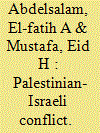

|
|
|
|
|
| Summary/Abstract |
Successive US administrations, including that of George W. Bush, have not recognized Palestinian interests and demands. The Bush administration initially showed a lack of serious intent to intervene in the Palestinian-Israeli conflict and had a negative position toward the Palestinians and their interests. However, subsequent Bush administration mediation of the Palestinian-Israeli conflict gained the Palestinians’ acceptance. This essay investigates the motivations and reasons behind the Palestinian officials’ endorsement of the mediation. The researchers conducted 6 face-to- face interviews and 112 structured interviews with senior Palestinians, including negotiators, security officials, political leaders, parliamentarians, academicians, and experts in the field.
|
|
|
|
|
|
|
|
|
|
|
|
|
|
|
|
| 13 |
ID:
130413
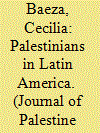

|
|
|
|
|
| Publication |
2014.
|
| Summary/Abstract |
Latin America is host to an estimated half-million people of Palestinian descent, the largest such population outside the Arab world. Migration to the region began in the late 1800s and peaked between 1900 and 1930, with surges around periods of war or economic crisis in Palestine. Predominantly the descendants of a pre-Nakba generation, mostly middle to upper-class Christians who are well-represented among political and business elites, Palestinians in Latin America do not easily fit into a national narrative shaped by the refugee experience. They have therefore held little interest for Palestinian historiography as they did not meet the criteria of "Palestinian-ness" as defined by a nationalist discourse centered on dispossession, denial, and statelessness. With a special focus on Chile,1 this article presents a historical overview of the Palestinian émigré community in Latin America, shedding light on its diverse and dynamic identity politics.
|
|
|
|
|
|
|
|
|
|
|
|
|
|
|
|
| 14 |
ID:
144933
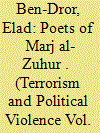

|
|
|
|
|
| Summary/Abstract |
In December 1992, after the kidnapping and murder of a policeman, Israel deported 415 members of Hamas and Islamic Jihad to Lebanon. Most were affiliated with the Hamas political apparatus and had not been involved in terrorism. The deportees decided to stay together and set up a camp in Marj al-Zuhur in southern Lebanon. Here they engaged in study and various cultural pursuits—including poetry writing. Roughly a dozen of the deportees wrote poetry. The poems were read aloud at gatherings in the camp and published in the Arab press. Their main function was to raise the residents’ spirits and keep their plight in the public eye. They incorporate the expected political messages: anger at Israel and criticism of the international community, the Palestinian leadership, and the Arab states, which were prodded to work harder for the deportees’ return. The poetry was part of a successful media and information campaign, which annoyed Israel so much that it allowed all the deportees to return home by December 1993. Some of the poems were later published and helped cultivate the myth of the Marj al-Zuhur deportation, which Hamas viewed as a victory and symbol of steadfast resistance to Israel.
|
|
|
|
|
|
|
|
|
|
|
|
|
|
|
|
| 15 |
ID:
175462
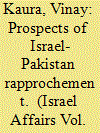

|
|
|
|
|
| Summary/Abstract |
Pakistan is among the Muslim Islamic states that do not recognise and/or maintain diplomatic relations with Israel. Yet this situation has been changing dramatically as various Muslim states are establishing and/or seriously considering relations with Israel. In recent years, Israel’s relations with Saudi Arabia and the United Arab Emirates have marked an unprecedented improvement as the focus of many Arab countries has shifted from the Israeli-Palestinian conflict to countering Iranian influence. India’s ability to maintain close relations with Israel while maintaining good relations with many Middle Eastern countries and the Palestinians is seen by Pakistan’s political elite as a strong reason for the need to have normal relations with the Jewish state. The article argues that the prospects of an Israel-Pakistan rapprochement are very dim at present due to continuing salience of ideological nature of the Pakistani state and the growing Islamist orientation of its people.
|
|
|
|
|
|
|
|
|
|
|
|
|
|
|
|
| 16 |
ID:
165825
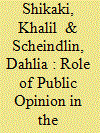

|
|
|
|
|
| Summary/Abstract |
While the most critical factor that leads to decline in support for a two-state agreement is the perceived lack of feasibility, surveys show that certain incentives can help increase support for a plan among both Palestinians and Israeli Jews.
|
|
|
|
|
|
|
|
|
|
|
|
|
|
|
|
| 17 |
ID:
184502
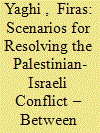

|
|
|
|
|
| Summary/Abstract |
Anticipating the future of the Palestinian-Israeli conflict in terms of possible and realistic solutions has taken on new dimensions that must be discussed seriously.
|
|
|
|
|
|
|
|
|
|
|
|
|
|
|
|
| 18 |
ID:
080865
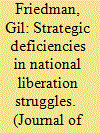

|
|
|
|
|
| Publication |
2008.
|
| Summary/Abstract |
This study reports and explains a cluster of deviations from the basic rational criteria of national liberation strategy exhibited by 'inside' West Bank Fatah leaders during the al-Aqsa uprising, based on an analysis of public statements of three such leaders. The leaders fail to recognize that their attempt to deter Israeli offensives by threatening to reciprocate them with attacks inside the Green Line is sabotaged by Islamists independently attacking inside the Green Line; inadequately attend to the distinct possibility that attacks within the Green Line increase Israeli opposition to desired concessions on refugees and territory; and appear to occasionally get swept-up in the sentiment that reciprocating Israeli aggression is inherently just. The study elaborates and examines the possible roles in these strategic deficiencies of leader strategic desperation; rage and indignation; and the political need to satisfy widespread popular militancy. The study's logic complements existing asymmetric conflict research and can inform research beyond the Palestinian-Israeli case.
|
|
|
|
|
|
|
|
|
|
|
|
|
|
|
|
| 19 |
ID:
182900
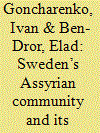

|
|
|
|
|
| Summary/Abstract |
This article examines attitudes within Sweden’s Assyrian community towards Israel, based on responses to a Swedish-language questionnaire distributed via the community’s electronic mailing list. The emergent picture is one of strong sympathy for the Jewish state, seen by respondents as a shining example of national self-determination based on the ingathering of the exiles – a dream nurtured by the world-dispersed small Assyrian nation. In addition, due to their deep animosity towards Turkey and the Arab states on account of their centuries-long persecution of the Assyrians, Swedish Assyrians tend to favour Israel in its feud with the Palestinians.
|
|
|
|
|
|
|
|
|
|
|
|
|
|
|
|
| 20 |
ID:
186054
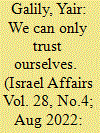

|
|
|
|
|
| Summary/Abstract |
This article contextualises the 1972 Munich Olympics massacre as an important factor in the advent of state counterterrorism strategy aimed at foreclosing the next terrorist outrage. While Mossad’s Operation Wrath of God failed to trace all culprits of the massacre, it nevertheless killed its mastermind Ali Hassan Salameh alongside scores of key PLO terrorists. This led to the effective demise of Palestinian terrorism in Europe and its return to the old modus operandi of attacking targets inside Israel. Fifty years after Munich, Israel needs to formulate an up-to-date strategy vis-à-vis Palestinian and Islamic terrorism that takes heed of the obstacles and opportunities presented by the current international system.
|
|
|
|
|
|
|
|
|
|
|
|
|
|
|
|
|
|
|
|
|